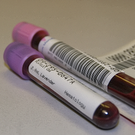
In a retrospective study of over 350 multiple myeloma patients who had a complete response to their initial line of therapy, researchers in the United States have found that a longer duration of response is associated with substantially longer overall survival.
In addition, the study authors found that patients who started second-line treatment due to a biochemical relapse had longer overall survival than those who started second-line treatment due to a symptomatic relapse.
A symptomatic relapse is one in which the patient experiences new bone lesions, anemia, or other defining …

Earlier this month, The Myeloma Beacon published a news article summarizing results of a clinical trial testing the combination of nelfinavir, Velcade, and dexamethasone as a treatment for relapsed multiple myeloma.
Nelfinavir (Viracept) is an orally administered drug that was approved in the 1990s for the treatment of human immunodeficiency virus (HIV), the virus that causes acquired immune deficiency syndrome (AIDS). Nelfinavir has not previously been used for the treatment of multiple myeloma.
Preclinical research has suggested, however, that nelfinavir might …

Results of a recent retrospective analysis indicate that stem cell transplantation may be underutilized in multiple myeloma patients 80 years of age or older.
Researchers from the M. D. Anderson Cancer Center in Houston found that only 0.5 percent (9 patients) of the 1,740 multiple myeloma patients who received an autologous (own) stem cell transplant between January 2007 and June 2018 at their institution were 80 years or older at the time of their first transplant.
Yet the transplant outcomes seen in this small sample of patients were favorable, and …

The Myeloma Beacon yesterday published a news article summarizing results of a study investigating testosterone levels in people recently diagnosed with multiple myeloma. The study, which was conducted at Ohio State University, found that almost three quarters of recently diagnosed myeloma patients have testosterone levels that are low for their gender and age.
To understand more about the study and its implications for people with multiple myeloma, The Beacon contacted Dr. Craig Hofmeister, a myeloma specialist …

Results of a recent observational study indicate that a substantial majority of recently diagnosed multiple myeloma patients have low testosterone levels.
Researchers at Ohio State University tested testosterone levels in the blood of over 550 people with a plasma cell disorder. More than 90 percent of the study participants had either multiple myeloma, smoldering multiple myeloma, MGUS, or a plasmacytoma. Across all the study participants, 74 percent had testosterone levels that were low given their gender and age.
Testosterone levels were measured within six months of diagnosis. Among the study …

Researchers from the Mayo Clinic confirmed in a recent study that close relatives of people with multiple myeloma have a higher risk of developing MGUS (monoclonal gammopathy of undetermined significance) than members of the general population.
In particular, the researchers found that "first-degree relatives" – parents, siblings, and children – of people with multiple myeloma were 2.4 times more likely to have MGUS than the general population.
This finding is in line with results of a previous Mayo Clinic study, which was smaller but included some of the same patients …

The U.S. Food and Drug Administration (FDA) has approved the addition of a once-weekly dosing regimen to the official prescribing information for Kyprolis.
In addition, the FDA approved revisions in the prescribing information related to two safety issues: the risk of heart-related side effects due to Kyprolis, and the risk of birth defects or miscarriage in women taking or exposed to Kyprolis during pregnancy.
The once-weekly dosing of Kyprolis is approved for use in combination with dexamethasone (Decadron) in multiple myeloma patients who have relapsed after one to three prior …